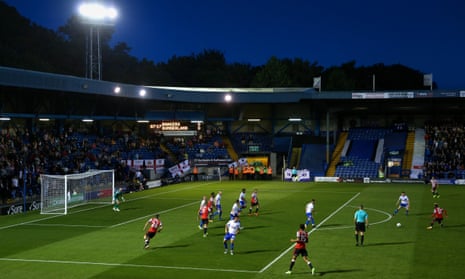Bury football club announced a takeover on Tuesday, saying the owner, the Lancashire‑based property developer Stewart Day, had handed control to Steve Dale, about whom the club statement said little, beyond that he is “a very successful businessman”.
More details about Dale and his businesses are promised imminently; a club spokesperson told the Guardian that Dale had been retired in recent years because of a severe illness, from which he has been given the all clear.
“Mr Dale decided to return to business in a more philanthropic way, helping younger people and others who have lost hope,” a spokesperson said. “Having heard about Bury, he felt he could bring business acumen to the club … and resolve the problems the club has been facing.”
Bury’s announcement acknowledged that last season’s relegation from League One “hit the club hard”, causing “cash flow issues” at a club that periodically skidded towards financial difficulties since Day’s ownership began in May 2013.
Ryan Lowe’s team secured a 2-0 win over Exeter City on Saturday to stay in solid contention for League Two promotion, which was a spirited achievement for his players considering that many had not yet been paid their November wages. A source close to the players told the Guardian that up to 11 had not been paid by then; the club said Day settled the wages owed before he left.
The Pensions Regulator is also understood to have been in contact with Bury after money deducted from players’ wages for contributions were not in fact paid into their pensions. In a letter from the pension provider, seen by the Guardian, one player was informed that five months’ contributions, between last December and April this year, were not fully paid into his pension.
A spokesperson for the Pensions Regulator said its policy was not to comment on individual cases but explained that such situations were not exceptional. More than 6,000 unpaid contribution notices were sent to employers between July and September this year, she said.
The Professional Footballers’ Association’s assistant chief executive, the former Blackburn Rovers and Queens Park Rangers midfield player Simon Barker, is understood to have been negotiating on behalf of the Bury players for the late wage payments.
Some suppliers are also said to have not been paid on time. The club spokesperson said following the takeover: “It is early days but letters/emails are going out to the creditors this week and a thorough audit is being carried out by our accountants, MGR Weston Kay. Once the information is collated a plan will be implemented and all creditors paid in full.”
Bury is a club of deep football heritage which now paddles doggedly to stay afloat, having long been absorbed into the Manchester United and City catchment areas, since the double FA Cup-winning heyday in the early years of the 20th century. Day took over during another downturn of financial trouble and has kept the club going, promoted to League One in 2015 then down again last season, while taking out high-interest loans and in 2016 being repeatedly hit with winding-up petitions for unpaid tax by HM Revenue and Customs, which were ultimately settled.
The current position had begun to look difficult again, for the 3,000 loyal souls who huddled into Gigg Lane to support Bury at the victory over Exeter. Just last month the club borrowed an unspecified amount of money secured on the lounge and sports bar at the entrance to the ground, from Express Loan Corporation, which is registered in the tax haven of Monaco. Another mortgage was secured on Gigg Lane itself last October, when the club borrowed £1.6m from a Liverpool-based loan company, Capital Bridging Finance Solutions. The interest rates for these loans are not stated on the public documents.
In 2016 Day and his co-director, Glenn Thomas, had stated that Day’s company, SG Sports Management, had been supporting the club with credit but after that company was dissolved they said the facility was now being provided by a different company, Mederco (BFC) Ltd. Companies House records show Mederco (BFC) Ltd to be a year and three months late filing its 2015-16 accounts, and it was in April subject to a notice of being struck off the company register; that action was discontinued on Tuesday.
The most recently published accounts for Bury FC itself, for the year to 31 May 2017, when the club survived in League One, show a loss made of £2.8m. A different Day company, Mederco Ltd, was stated to have loaned the club £4.2m, and the accounts said that Day was prepared to transfer that debt into shares, effectively writing off repayment, if necessary. Mederco Ltd’s Companies House filings show that it has twice been given notice of compulsory strike off for failure to file required information, and the 2016-17 accounts are now three months overdue. The 2016 accounts show that Mederco had loaned £5m to five associated Day companies. The club spokesperson suggested that Day’s loans would be repaid in full, along with the club’s other creditors.
Day, announcing his departure on Tuesday, hailed the boost to the club’s youth development operation from the move in 2015 – on a five-year lease – to the Carrington training complex, which Manchester City vacated for their £200m Etihad campus academy.
“I feel I have left the club in a stronger position than it was in when I arrived,” he said, explaining that he was leaving the club “with a heavy heart”, to spend more time with his family.
